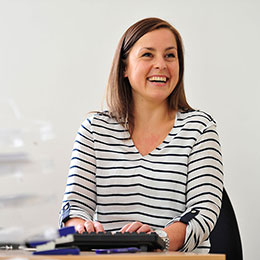8 Questions for Andrea Unkelbach

Senior Project Manager Andrea Unkelbach is celebrating 15 years at Peschel Communications this year – the perfect occasion to ask her a few questions.
When you first joined Peschel Communications (then still called Übersetzungsbüro Peschel), did you expect to still be working here 15 years later?
To be honest, I did not have any expectations at all. I had just graduated, had no practical experience just theoretical knowledge – and did not have any idea what a translator’s everyday life was like. I learned so much every single day, especially at the beginning. And it quickly became clear that I didn’t really want to be a translator – that project management was what I was passionate about, working in direct contact with clients and colleagues. Over the years, Übersetzungsbüro Peschel evolved, and so did I. There was always something new happening, so I never got bored. That is probably why it never occurred to me to seek out a new challenge.
How has your typical day at work changed in the last 15 years?
The language industry has made immense technological progress in the last 15 years – and we were always at the spearhead of progress. We initially relied on Excel to organise our client and order lists, eventually switching to a simple desktop management system followed by a professional, web-based translation project management software which also “talks to” our CAT tool and email system.
At the beginning, I was able to manage all of our projects on my own. Today, there are four project managers at Peschel Communications, which means that on top of the typical day-to-day management of translation projects, I am also team leader and am involved in strategic development. Every time I think that I can finally lean back and just let things fall into place as they should, something new pops up, decisions have to be made, new processes have to be introduced. There is never a dull moment.
Are there any aspects of your working life 15 years ago that you miss?
Actually, I absolutely love managing translation projects. Today, I have a lot of additional tasks which means that I don’t often have the opportunity to manage a project from start to finish. So I am always happy when I get to step in for one of my colleagues and spend all day managing projects. Talking to clients, juggling projects and making sure every piece of the puzzle fits up until a translation is ready for print – and the feeling you get when everything has worked out – these are the things I enjoy the most and which give me the greatest sense of satisfaction.
If you weren’t a translation project manager, what profession would you have chosen?
I think if I had to choose a new career, I would probably be a pastry chef. But that’s a passion that I have only developed in recent years. And besides, I don’t think I would like the hours.
Of all the projects that you have managed over the years, is there one that has really stuck in your mind?
I remember many projects quite well – for many different reasons. But one of the most exciting challenges in recent years was a website for our longstanding client KNF Neuberger GmbH, which we translated into 11 languages. If you have 11 languages, that means that a minimum of 22 translators and revisors are involved, as well as our project managers, the client’s project managers, graphic designers, web developers, copywriters, etc. Juggling all of that was very exciting indeed.
You have a very wide range of tasks. Which characteristics would you say define a good project manager?
Keeping a cool head when things get heated, always staying on top of things and remaining flexible are definitively important traits to have. When I get to my desk in the morning, I usually have no idea what the day may bring. What may start off as a quiet morning can become really hectic in the blink of an eye. Managing to keep your cool and never losing your sense of humour are certainly valuable assets to have.
How has your typical day at work changed during the pandemic? What new challenges are you faced with as a project manager?
What springs to mind first – and this is probably the word of the year – is working from home. Before the Covid pandemic, I was absolutely convinced that project management from home was impossible. I eventually learned otherwise. Nevertheless, I find it immensely important to be in direct contact with my colleagues, and by direct contact I mean face-to-face and in person. Direct contact allows you to respond to questions much more quickly than by typing out the answer or initiating a video call. I would rather not go back to working from home full-time.
I have also noticed that people have a much greater need to talk than before the pandemic. This is something I have noticed in myself, within our internal and our external, global team as well as when talking to clients. As challenging as these times may be, they have also afforded me the opportunity to engage in many good conversions that I otherwise probably would not have had.
What changes or developments are you hoping for?
Technology is developing fast, and that’s a good thing. I am always curious about technological innovations and can’t wait to see what the future may bring. Digital technology can help us a great deal by enabling automated and streamlined processes. But I truly hope that this will not replace personal contact.